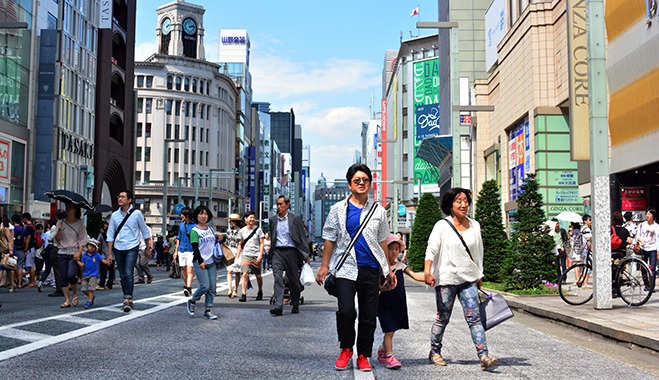
Japan’s growth prospects suffered another knock in July, as its economy failed to make the predicted third quarter turnaround. Official figures show April’s sales tax hike is continuing to affect consumer behaviour, slowing growth seen in the first quarter.
“Today’s data on industrial production and retail sales show that the economy continued to stagnate at the start of the third quarter,” says Marcel Thieliant, Japan Economist for Capital Economics. “What’s more, inflation moderated in July and is set to decline further, which should increase the pressure on policymakers to do more.”
Without the third quarter turnaround that so many expected, confidence in Abenomics continues to fall
Decades of deflation have encouraged consumers to hoard savings in the hope prices will fall further. Shinzo Abe’s stimulus package marked a return to inflation, but consumers are still reluctant to increase spending. This is a predicament for an economy that relies in large part – 60 percent – on private consumption.
After a 6.8 percent annualised slump during April-June, caused by the sales tax hike, Abe’s government have failed to instruct a quick turnaround. “The recent sluggishness in spending is indeed largely a result of the consumption tax hike,” says Thieliant. “But business surveys suggest that the economy will recover in the second half of the year.”
Core inflation for July, at 1.3 percent, fell within the BoJ’s target of two percent, though without a rise in wages the rise counts for little. Retail sales, however, represented a small positive, after rising 0.5 percent on the year previous, following a 0.6 percent slump in June.
The prospect of a ‘virtuous cycle’ seems distant, with inflation failing to stimulate wage increases, despite government calls for companies to raise pay. Without the third quarter turnaround that so many expected, confidence in Abenomics continues to fall.
“More worrying is arguably that wages are not picking up despite the government’s exhortations. Japan’s trade unions simply lack the bargaining power to push through higher pay deals,” says Thieliant. “That said, price pressure should moderate in coming months as the impact of the weak yen is fading, which should provide some relief to households.”


